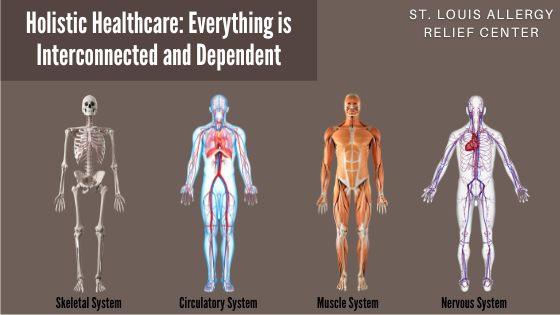Holistic Healthcare: Everything is Interconnected and Dependent

What is Holistic Healthcare?
In recent years, holistic medical practices and treatments have risen in popularity. Considering its ancient origins in Eastern, Native American, and European cultures, holistic medicine is an extremely old and effective approach to healthcare. Many patients have found relief from an array of medical disorders and diagnoses.
Holistic healthcare views the human body as an organic structure of interconnected and dependent organs and systems. It is based on the idea that in order to successfully treat one part of the body, the doctor must also evaluate the interaction of the physical, psychological, social, and spiritual well-being of the patient. By evaluating the body with these elements in mind, doctors have found that there is an inter-relation between these states of being. For example, it is believed that if your emotional health is poor, you will also suffer physically and vice versa.
With all of this in mind, let’s look at how and why the human body is composed of independent organs and systems that are simultaneously interconnected and dependent on each other.
Courtesy of Advanced Allergy Therapeutics
Courtesy of National Geographic
Interconnected and Dependent
Medical science has identified many independent systems operating within our body: the skeletal system, the respiratory system, the digestive system, the reproductive system, and the endocrine system, as well as the networks that impact blood and lymph vessels (aspects controlled by the brain and nervous system).
Furthermore, all of these individual systems interrelate which each other. In this article, we will address how these independent systems must work together to provide the highest level of effectiveness and health.
On a microscopic level, our body is made up of small individual systems that are organized within our cells, tissues, and organs. These microsystems work together to form larger systems that shape our ability to breathe, walk, talk, and think. When one system fails or suffers, it is inevitable that the rest of the body suffers simultaneously, as each system has a cascading effect on all other bodily functions.
Medical science has shown that our nervous system constantly transfers information from our cells and tissues throughout the body 24/7. In addition, the different organ systems within our bodies process and react to different types of information that is received through our senses. Let’s use allergies as an example to explain this process.
When a substance, such as pollen, is absorbed or sensed by the immune system, it is usually checked out to be harmless. However, if the immune system erroneously perceives that pollen as harmful, a series of reactions take place that trigger allergic symptoms such as sneezing or difficulty breathing. Additionally, that negative reaction, or inflammation, within the respiratory system can trigger other inflammation on the skin, in the glands, and even in the gastrointestinal system. Identifying body systems as subsystems of a whole, is the hallmark of holistic care. Holistic treatments allow for more effective results.
Below is a graphic to help you visualize how pollen exposure can cause reactions in other body subsystems if you are sensitive to the pollen spores.
Courtesy of KidzAid Australia
In other words, there is an interconnectedness between the major organ systems of our body and overreactions to harmless substances. It is the health and state of the organ systems which determines the type of symptoms that may arise.
Let’s use reactions to dairy or cow’s milk as an example to help make this easier to understand. One person may have a reaction to cow’s milk by getting rashes, while another patient may react with sinus congestion. Someone else who reacts to cow’s milk or cheese may experience heartburn, while another person has diarrhea or vomiting or irritable bowel syndrome. The symptoms in each of these cases represent a different organ system involved even though the trigger—cow’s milk—was the same. There is also an abundance of studies that show how emotional stress can manifest symptoms in any organ system.
Unfortunately, treating the individual symptom with drugs or supplements without getting to the underlying condition, will just perpetuate future problems. The hallmark of holistic healthcare is to identify and treat the underlying conditions that trigger the symptoms.
St. Louis Allergy Relief Center: Holistic Allergy Care and Treatment
St. Louis Allergy Relief Center is an allergy wellness center specializing in natural treatments using Advanced Allergy Therapeutics (AAT). Our holistic approach is non-invasive, and we do not use needles, shots, sublingual drops, herbal remedies, supplements, or avoidance. Our treatments are safe, effective, and gentle enough for infants and seniors.
After completing a comprehensive assessment and testing process, we provide you with a detailed evaluation and treatment plan to help with the seasonal, food, environmental, and chemical stressors that may be triggering allergies or allergy-like symptoms. Visit our website stlouisallergyrelief.com to learn more or call us at 314-384-9304.
Works Cited:
https://www.nationalgeographic.org/activity/interconnected-systems-human-body/
https://patient.info/doctor/holistic-medicine
https://holisticbillingservices.com/americans-turning-to-holistic-medicine/